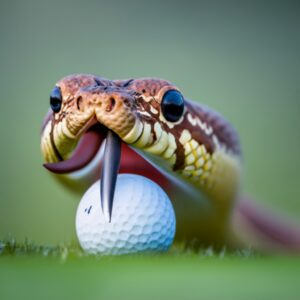You might have heard the peculiar myth that golf balls can kill snakes. This belief is widespread, especially among golfers and those living near golf courses. The idea is that snakes, mistaking golf balls for eggs, swallow them and subsequently die as they cannot digest the hard plastic.
Explanation of the common belief and controversy surrounding golf balls and snakes
The concept is based on the fact that some snake species are known to eat bird eggs. However, it’s crucial to understand that snakes have a highly flexible jaw that allows them to swallow large items. After ingesting an egg, a snake’s digestive system is designed to break down the shell and absorb the nutrients inside. A golf ball, on the other hand, is made of hard plastic that a snake’s digestive system cannot break down.
However, this does not necessarily mean that swallowing a golf ball will kill a snake. While it may cause discomfort or health issues, there’s no scientific evidence to support the claim that it’s lethal. It’s also worth noting that snakes are more likely to recognize a golf ball as an inedible object rather than mistaking it for an egg.
Do Snakes Eat golf balls?
While it sounds unusual, some people may wonder if snakes have been known to eat golf balls. This idea likely originates from the fact that certain types of snakes, such as pythons and boas, have been known to consume large prey. However, snakes do not typically eat inanimate objects – they lack the ability to digest non-organic material. So, the short answer is no, snakes would not naturally eat a golf ball.
This isn’t to say it’s impossible for a snake to swallow a golf ball. In fact, there have been numerous cases reported where snakes have been found with golf balls lodged in their gut. These occur due to a snake mistaking a golf ball for an egg or some kind of prey. This usually leads to a dangerous situation for the snake, as the golf ball blocks its digestive tract and can cause severe discomfort, illness, or even death.
In regard to the question, will golf balls kill snakes, the answer would be a probable yes. If a snake ingests a golf ball, it could be lethal. Unfortunately, there are some instances where people have used this as a cruel and illegal method of pest control, by leaving balls out for snakes to consume.
However, it is essential to remember that serving golf balls to snakes isn’t just harmful to them, it is also potentially lethal, and it is recommended to use humane methods to control snake populations if necessary.
Understanding snake anatomy and vulnerability
Snakes, those slithering creatures that can both fascinate and frighten, have unique anatomical structures. You might be curious if a golf ball could harm or kill a snake.
Snakes are vertebrates, meaning they have a backbone, just like you. Their bodies are elongated and flexible, allowing them to move smoothly. The structure of their body is such that they are more susceptible to injury from blunt force trauma than other animals.
Now, let’s talk about golf balls. A golf ball is small, hard, and when hit with force, can travel at high speeds. If a golf ball were to hit a snake directly, it could potentially cause injury. However, the likelihood of this happening is relatively low.
Why?
Because snakes are low-lying creatures. They tend to stay close to the ground and are usually protected by grass or other vegetation. This makes it unlikely for a golf ball to strike them directly.
Moreover, snakes have evolved over millions of years to survive in their environment. They are resilient creatures and can often recover from injuries that would be fatal to other animals.
In conclusion, while a direct hit from a golf ball could potentially injure a snake, the chances of this happening are slim. It’s best to respect all wildlife when you’re out on the golf course – snakes included!
Misconceptions about golf balls and snake mortality

As an animal lover or a golf enthusiast, you might have heard the bizarre claim that golf balls can kill snakes. This claim is based on the idea that snakes, mistaking golf balls for eggs, swallow them and die as a result. It’s time to debunk this myth and clear up some misconceptions.
Fact Check: The truth is, most snakes are incapable of swallowing a golf ball due to its size. Only a handful of large snake species, such as pythons or anacondas, could potentially swallow a golf ball. However, these species are smart enough to differentiate between an egg and a non-edible object like a golf ball.
Scientific Evidence: There’s no scientific evidence supporting the claim that snakes die from ingesting golf balls. Snakes have a highly developed sense of smell and touch, which they use to identify their food. They wouldn’t mistake a hard, rubbery golf ball for a soft, nutritious egg.
Animal Cruelty: It’s worth noting that intentionally feeding indigestible objects to snakes is considered animal cruelty. It’s crucial to respect all forms of life and treat animals with kindness.
In conclusion, the idea that golf balls can kill snakes is nothing more than an unfounded myth. Snakes are intelligent creatures with highly developed senses that allow them to distinguish between food and non-food items. So next time you hear this myth, remember to debunk it!
Potential dangers and harm caused by golf balls
As an avid golfer, you may not have considered the potential harm that a stray golf ball could cause to wildlife, particularly snakes. It’s important to remember that golf courses are often home to a variety of wildlife, including these reptiles.
Discussion of the risks and potential harm that golf balls can pose to snakes, albeit not fatal
Let’s discuss the potential risks. Golf balls, due to their size and weight, can indeed cause harm to snakes if they hit them directly. The impact of a fast-moving golf ball can lead to physical injuries such as bruising or fractures.
However, it’s worth noting that these injuries are likely not fatal. Snakes are resilient creatures and can recover from such incidents given time and absence of further harm.
What about ingestion? There have been instances where animals, including snakes, have mistaken golf balls for eggs or prey due to their size and shape. If a snake were to ingest a golf ball, it could lead to serious internal blockages and complications.
Here’s a recap table:
| Potential Harm | Explanation |
|---|---|
| Physical Injuries | A fast-moving golf ball can cause bruising or fractures if it hits a snake directly. |
| Ingestion | If mistaken for prey or an egg, a snake may ingest a golf ball leading to internal blockages and complications. |
Remember, respect for nature is part of the game!
Snake behaviors and avoidance tactics

As an avid golfer or a curious individual, you might have heard the myth that golf balls can kill snakes. But is there any truth in this? Let’s delve into the fascinating world of snake behaviors and instincts to find out.
Exploration of snake behaviors and natural instincts that enable them to avoid golf balls and potential danger
Snakes are intelligent creatures with complex behaviors and instincts. They have a keen sense of their surroundings, which enables them to avoid potential dangers. With their heightened senses, they can detect vibrations from movement, changes in temperature, and even the chemical composition of objects around them.
How does this relate to golf balls? Well, when a golf ball is in motion, it produces vibrations that snakes can detect. These vibrations signal danger, causing the snake to slither away for safety. Even when a golf ball is stationary, snakes are unlikely to interact with it due to its foreign smell and texture.
Can a golf ball kill a snake? It’s highly unlikely. Snakes are agile creatures capable of avoiding fast-moving objects like golf balls. Even if a snake was hit by a golf ball, it would probably result in injury rather than death.
So, what’s the bottom line? The myth that golf balls can kill snakes is largely unfounded. Snakes are more likely to avoid golf balls due to their natural instincts and survival behaviors. So next time you’re on the green, don’t worry about your golf game turning into a snake-killing spree!
The role of golf course management and snake conservation
As an avid golfer, you might have wondered about the impact of golf balls on the wildlife that inhabit the golf course, specifically snakes. It’s a valid concern, given that golf courses often serve as habitats for a variety of wildlife, including snakes.
Highlighting the importance of proper golf course management practices in coexisting with snake populations
Snakes and golf courses: Golf courses can be a haven for snakes due to the diverse habitats they offer. However, the relationship between golfers and snakes can be complicated. While no concrete evidence suggests that a golf ball can kill a snake directly, indirect harm can occur. Snakes may be injured by fast-moving balls or disturbed by the constant activity.
Proper management practices: To ensure coexistence, proper golf course management practices are crucial. These include maintaining natural areas on the course, managing pesticide use, and educating golfers about the importance of wildlife conservation.
Education is key: As a golfer, understanding that snakes play a vital role in maintaining ecosystem balance is essential. They control rodent populations and serve as prey for larger predators.
The bottom line: While your golf balls may not directly kill snakes, they can cause harm. So, it’s important to be aware of your surroundings while playing and respect all forms of life that call the golf course home.
Remember, good sportsmanship extends beyond the game – it includes respecting the environment and all its inhabitants too.
Alternatives to harming snakes on golf courses

As a golf enthusiast, you might have come across a slithering friend on the golf course. The sight of a snake might cause panic, and you may wonder if a golf ball could kill a snake. However, it’s essential to remember that snakes play a crucial role in the ecosystem by controlling pests and should not be harmed.
Suggesting strategies and practices for safely managing snakes without resorting to violence or harm
1. Educate Yourself and Others: Understanding the types of snakes you might encounter on the course can help reduce fear and promote coexistence. Most snakes are harmless and more afraid of you than you are of them.
2. Maintain the Course: Regular maintenance of the golf course can discourage snakes from making it their home. Keeping grass short, removing debris, and sealing any potential hiding places can make the course less attractive to snakes.
3. Call Professionals: If you encounter a snake, don’t attempt to handle it yourself. Instead, call a professional wildlife removal service who can safely remove and relocate the snake.
4. Use Snake Repellents: There are snake repellents available that can be used around the golf course to deter snakes without causing them harm.
Remember, while your safety is important, it’s also crucial to respect all forms of life. So next time you see a snake on the golf course, don’t reach for your golf ball – reach for your phone and call a professional!
Expert opinions and studies on the subject

As a golf enthusiast or a snake lover, you may have heard about the myth that golf balls can kill snakes. This belief has been circulating for years, suggesting that snakes mistake golf balls for eggs and die from ingesting them. But is there any truth to this?
Citing research and expert opinions that provide insights into the impact of golf balls on snakes
According to professionals in herpetology, the study of reptiles and amphibians, there’s no scientific evidence to support the claim that golf balls can kill snakes. Dr. Bryan Fry, a renowned herpetologist, states that it’s highly unlikely for a snake to confuse a golf ball for an egg due to their different textures and smells.
Furthermore, research conducted by the Savannah River Ecology Laboratory found no instances of snakes dying from ingesting golf balls. The study examined hundreds of snake stomach contents and found no evidence of golf ball ingestion.
In fact, most snakes have a highly developed sense of smell and taste, which they use to identify their food. Therefore, the likelihood of them confusing a synthetic object like a golf ball for an egg is extremely low.
So, next time you’re out on the green, don’t worry about your stray shots harming any nearby slithering friends. It’s safe to say that your golf balls won’t be causing any harm to these fascinating creatures.
Here’s a table summarizing this information:
| Claim | Expert Opinion |
|---|---|
| Golf Balls Can Kill Snakes | – Dr. Bryan Fry: Highly unlikely as snakes can distinguish between textures and smells. – Savannah River Ecology Laboratory: No evidence found in study examining snake stomach contents. – General Herpetology Consensus: Snakes use their highly developed sense of smell and taste to identify food, making it unlikely they’d confuse a synthetic object like a golf ball for an egg. |
Conclusion- Will Golf Balls Kill Snakes?
You’ve probably heard the myth that golf balls can kill snakes. This belief is based on the idea that snakes, mistaking golf balls for eggs, will attempt to eat them and subsequently die from internal damage or blockage. However, it’s crucial to examine this claim with a balanced perspective.
Summarizing the findings and offering a balanced perspective on the topic of golf balls and snake mortality
Scientific Evidence: There is no scientific evidence to support the claim that golf balls can kill snakes. Snakes are smart creatures with selective diets, and they’re not likely to mistake a golf ball for an egg.
Snake Behavior: Snakes typically swallow their food whole and have been known to regurgitate items that cannot be digested. If a snake were to ingest a golf ball, it would likely regurgitate it rather than suffer from internal damage or blockage.
Humane Treatment: It’s important to remember that all creatures, including snakes, should be treated humanely. Intentionally causing harm to snakes by tricking them into eating golf balls is not ethical or legal in many places.
To sum it up, while the myth that golf balls can kill snakes persists, there is no scientific basis for this claim. Instead of resorting to harmful methods, consider humane ways to deal with unwanted snakes around your property. Remember, every creature plays a vital role in our ecosystem.
Here’s a table summarizing the key points:
| Key Point | Explanation |
|---|---|
| Scientific Evidence | No scientific evidence supports the claim that golf balls can kill snakes. |
| Snake Behavior | Snakes are unlikely to mistake a golf ball for an egg and would likely regurgitate an indigestible item like a golf ball. |
| Humane Treatment | Causing harm to snakes by tricking them into eating golf balls is not ethical or legal in many places. Consider humane methods for dealing with snakes. |
How To Keep Snakes Away From Your Poultry
Keeping your poultry safe from snakes is important for the wellbeing of your birds and your peace of mind. Here are some effective strategies to keep those slippery reptiles away:
- Clear the area: Remove any debris or clutter around the poultry coop or chicken run where snakes may hide. Keep the surroundings well-maintained and free of tall grass or bushes.
- Fence it off: Install a snake-proof fence around the perimeter of the poultry area. Use sturdy materials like wire mesh with small openings, bury the fence at least 6 inches deep, and make sure it is high enough to prevent snakes from climbing over.
- Keep it clean: Regularly clean the poultry coop, removing any spilled food or waste that may attract rodents. Snakes are drawn to areas with abundant prey, so maintaining cleanliness will deter them.
- Use deterrents: Consider using natural snake repellents like sulfur powder, garlic, or essential oils with strong scents that snakes dislike. Apply them around the poultry area or use them to create a protective barrier.
- Secure entrances: Seal any holes or gaps in the coop or chicken run that may serve as entry points for snakes. Pay attention to gaps in doors, windows, and ventilation holes.
By implementing these preventive measures, you can significantly reduce the likelihood of snakes entering your poultry area. Remember, an ounce of prevention is worth a pound of cure when it comes to keeping your birds safe.

I’m Donna Weiss, and I am the proud writer behind the captivating content you’ll find on golfneedy.com. As an avid golfer and passionate writer, I have combined my two greatest passions to bring you an incredible golfing experience. Through my articles, I aim to provide you with valuable insights, equipment reviews, and updates on the latest tournaments. Whether you’re a seasoned golfer or just starting out on this exciting journey, I am here to guide you and share my expertise. Together, let’s explore the fascinating world of golf, uncovering new techniques, and enhancing our skills. Join me on this thrilling adventure as we elevate our game and embark on an exciting golfing journey. Read More



